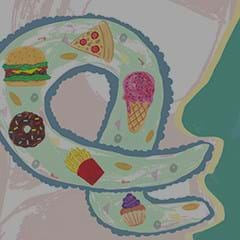Paediatric endocrinologist Robert Lustig was one of the first people to sound the alarm on the dangers of too much sugar. But, he says, that sweet sensation is only one of the ways modern life feeds our dopamine-based pleasure and reward system.
Drugs, mobile phones, social media, fast food, coffee, gambling and even shopping can have a similar, short-term but highly compulsive effect on human behavior.
As a result, serotonin – the chemical that actually makes us happy – loses out. Most surprisingly, dopamine and serotonin do not overlap, says Lustig.
You can hear him explain the differences, and what it means for our ability to be truly satisfied with life, in this fascinating interview.
This interview comes courtesy of Radio New Zealand.
Pleasure, says Lustig, is short-lived, visceral, can be experienced alone, and can be caused by substances or behaviors.
Happiness, on the other hand, is long-lived, ethereal, usually social, and cannot be had from substances or behaviors.
“The extremes of pleasure, whether they be substances or behaviors, lead to addiction,” he says. “But there’s no such thing as being addicted to happiness.”
The key to this lies in the fact that dopamine and serotonin are two different bio-chemicals, two different neuro-transmitters, in two different areas of the brain.
Dopamine is what is called an “excitatory” neurotransmitter. “It turns out neurons like to be tickled,” Lustig says, “but they don’t like to be bludgeoned. Chronic over-stimulation of a neuron causes neuronal cell death.”
As a consequence, the neuron next to a dead one will trigger a self-defence mechanism to down-regulate the receptors for dopamine, so that it too won’t die.
What does that mean for humans? “You get a rush, the receptors go down and next time, because there are fewer receptors, you need a bigger hit to get the same rush.”
This goes on until even a huge hit has no effect. “That’s called tolerance. And when the neurons start to die, that’s called addiction.”
Serotonin does not behave this way because it is an “inhibitor”.
“It doesn’t cause the next nerve to fire,” says Lustig, “it causes the next neuron to stay silent. You can’t overdose on happiness.”
However, there is one thing that can down-regulate serotonin – dopamine. “So the more pleasure you seek, the more unhappy you get.”
That’s why addiction and depression are different sides of the same coin.
“Addiction is from too much dopamine driving down the receptor and then the neurons die. Whereas depression is serotonin deficiency – too little serotonin, which has been driven by the dopamine.”
The process works the same way for things other than drugs that give us pleasure.
“The fact is, human beings have this area in our brain – the reward center – and every single thing that we find rewarding, that signal is transduced [converted]. If it’s rewarding, it’s mediated through that system.
“Industry has taken advantage of this little hitch in our biochemistry, in the neural science of our brain, to supply us with all we want. And as we do, we get more and more miserable and ultimately either plunge into addiction or depression or both.”
The more a product gives you a dopamine rush, the more addictive it is – think Facebook or any social media platform.
“Your cell phone is just a slot machine in your pocket.”
All big corporations have neuroscientists working for them, Lustig says. Fast food companies, too, are adept at peddling substances (sugar and caffeine) that directly affect the reward center of the brain.
The fact that fast food and soft drinks are “price inelastic” – meaning, even when prices rise, demand stays the same – is a sign addiction is at play, he adds.
“We have the data, we have the neuroscience, we have the imaging studies, we have the biochemistry to demonstrate how the food industry has basically doctored our food supply so as to make it absolutely irresistible, and in the process we have gotten sick.”
Compounding the problem, a chemical in the gut needed to make serotonin – tryptophan – is not found in processed food. Tryptophan is the rarest amino acid in our diet, found in eggs, fish and some poultry – three items rare in processed food.
“People eating a high processed food diet probably are not even getting the precursor to make the serotonin in the first place, so that is a great reason for unhappiness.”
Lustig says he has a simple, evidence-based, four-step process to combat this problem.
To tamp down the dopamine and up the serotonin, focus on the Four Cs – Connect, Contribute, Cope and Cook.
- Connect with eye-to-eye human contact, not social media. “It’s now been shown that Facebook drives unhappiness and depression. After two weeks of Facebook you end up less happy than you were before,” he says.
- Contribute by forms of giving from which you gain no material reward.
- Cope by getting enough sleep and exercise, and by being mindful.
- Cook to get the nutrients you need in the right amounts. “You need high tryptophan, high omega 3 fatty acids and low sugar. That’s called a real diet.”
Dr Robert Lustig is the author of The Hacking of the American Mind: The Science Behind the Corporate Takeover of Our Bodies and Brains.

This content is published under licence and in partnership with Radio New Zealand, one of the world’s foremost public broadcasters. To learn more go to radionz.co.nz.
If you want more tried, tested and true news from the leading edge of health and fitness sign up to get Fit Planet insights and advice straight to your inbox.
Follow the freshest thinking @fitplanetmag.








